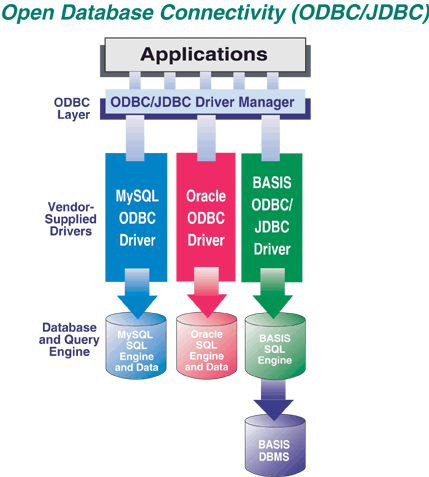ODBC/JDBC DRIVERS
Overview
Access to corporate data used to be difficult. Businesses could either accept a limited number of queries and reports provided by their system developers or spend significant amounts of time and money creating custom reports and queries. What these businesses needed was a solution that would give their employees the ability to make their own reports and queries using the Windows productivity programs they already know, such as Microsoft Access and Microsoft Excel, and Crystal Reports.
By providing an industry-standard application program interface (API) between Windows applications and BASIS databases, the BASIS ODBC/JDBC Driver gives users transparent access to corporate data. Utilizing a wide variety of ODBC/JDBC-aware tools such as spreadsheets, graphics programs and Web browsers, end users can make the best use of this valuable data.

Minimum + SQL Grammar and Level 1 API
The BASIS ODBC Driver supports Minimum + SQL Grammar and Level 1 ODBC API. This translates into an ODBC driver that handles SQL in a more standardized way and a shorter learning curve for employees who already understand SQL functionality. At these two levels of compliance, the BASIS ODBC/JDBC Driver can supply over 30 scalar functions, including ASCII, POWER (double, integer), RAND (double), REPLACE (char, char, char), CURTIME and DATABASE.
Aggregate functions such as SUM, MEAN and MOD are available while functions like EXISTS, NOT EXISTS, IN and NOT IN have been added.
Data Abstraction With the BBjRecordSet
A BBjRecordSet is a logical view of a set of records defined in terms of an SQL SELECT or a BBj® multi-keyed file. BBjRecordSets are useful in several ways:
- Unlike a standard BBj SQL SELECT channel, an SQL-based BBjRecordSet is directly updatable using the insert(), update() and deleteCurrentRecordData() methods
- The developer can navigate freely back and forth through a BBjRecordSet using first(), next(), previous(), last() and move(+n/-n)
- Using the seek(), seekForward(), and seekBackward() methods, the developer can scan through a BBjRecordSet for records that match any criteria
- BBjRecordSets provide the underlying plumbing to support Databound Controls
Additionally, the BBjRecordSet lets developers abstract the data handling code by providing a common interface for both file and SQL access. The SQL access lets developers incorporate data from any ODBC/JDBC-capable database into a BBj application.
BBjRecordSets offer developers a new and powerful way to view and manipulate data. Not only do they provide extensive capabilities in an easy-to-understand object-oriented manner, but they abstract the data, freeing the programmer from the detailed low-level file I/O operations that were necessary in the past. Using BBjRecordSets, developers can quickly access selected data in a few lines of code, and then easily search and manipulate that subset. After using BBjRecordSets a couple of times, developers may wonder how they ever programmed without them!
For more information about BBjRecordSets and Databound Controls, refer to the BBjRecordSet API documentation and the articles Using the BBjRecordSet, BBj Databound Controls, and Why Use the BBjRecordSet? published in the BASIS International Advantage.